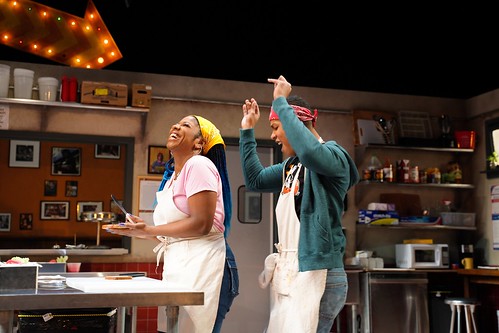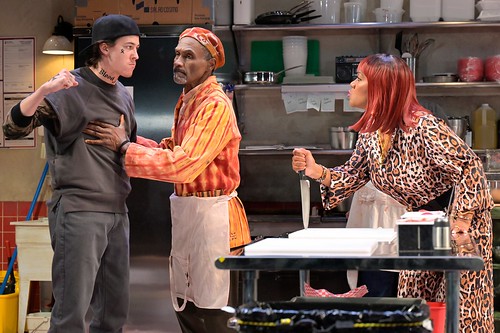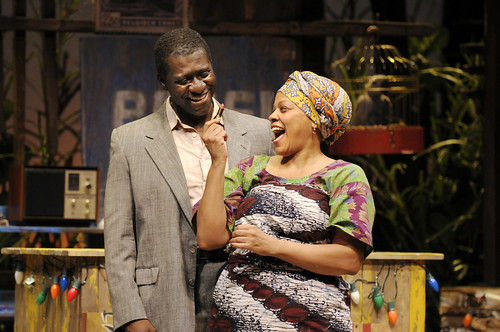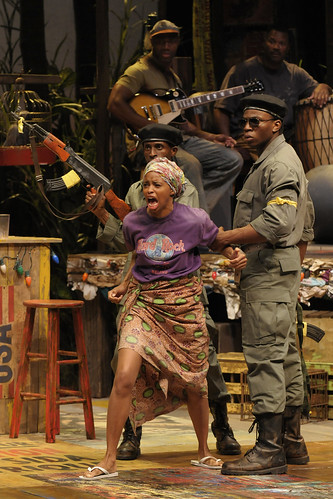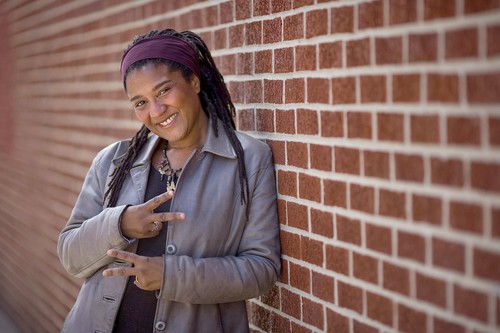
ABOVE: Roman Banks as ‘MJ’ and the cast of the MJ First National Tour, part of the BroadwaySF season at the Orpheum Theatre through Feb. 25. BELOW: Jaylen Lyndon Hunter (center left) is Little Marlon and Ethan Joseph (center right) is Little Michael. Photos by Matthew Murphy
The first two numbers of Act 2 are my dream Michael Jackson musical. The rest of MJ, now at the Orpheum Theatre as part of the BroadwaySF season, is a classy, well-pedigreed but still boilerplate biographical jukebox musical.
When Act 2 begins, the thrilling Roman Banks – tasked with being as remarkable a singer and dancer as Michael Jackson and rising admirably to the challenge – is alone on stage with a suitcase. He pulls out a sparkly jacket, then a single, sparkly glove. Then a fedora. That instantly recognizable bass kicks in, and he re-creates Jackson’s nuclear blast of “Billie Jean” on 1983’s Motown 25: Yesterday, Today, Forever TV special. Now that was a moonwalk to remember.
Before we can even catch our breath from that, the show takes us into Michael’s creative process as he imagines dancing with some of his most inspirational heroes: Fred Astaire, Bob Fosse and the Nicholas Brothers. As the music morphs into “Smooth Criminal,” it’s another thrilling moment in a show that has a few others but not enough because it gets bogged down by biography and by the uneasy weight of Jackson’s legacy.
With a book by two-time Pulitzer Prize-winner Lynn Nottage, MJ at least tries to have it all ways: please the Jackson estate, deliver Jackson’s hits complete with dazzling choreography (by director Christopher Wheeldon) and attempt some honesty around Jackson’s issues like painkiller addiction, abuse at the hands of his bully of a father and vague references to his legal troubles involving the sexual abuse of minors.
But the creators don’t wanna be startin’ that something, so their focus is Jackson as a brilliant, troubled artist putting the finishing touches on his 1992-93 Dangerous world tour, which would ultimately be seen by more than 3 1/2 million people. Nottage uses the gimmick of having an MTV reporter and cameraman in the rehearsal room as a way to tease biographical details from Jackson and launch flashbacks into the Jackson 5 era and then into the Off the Wall and Thriller periods. At Wednesday’s opening-night performance, Young Michael was played by the charismatic Bane Griffith. And the middle-period Michael was played by Jacob Kai, also impressive.
If the show were only songs and dances depicting different periods of Jackson’s life, that would be more than sufficient to convey his artistry without having to delve into the man’s troubled life. Wheeldon’s Tony-winning choreography is always exciting and executed beautifully by the nimble ensemble. The Michaels, especially Banks as the primary Michael, evoke Jackson in ways that truly are thrilling. Ironically, the “Thriller” number tries to layer on too much psychological turmoil and ends up draining much of the original’s fun.
The production values for this touring production are notably sharp and appealing. Though Derek McLane’s set is basically a Los Angeles rehearsal hall, Natasha Katz’s lighting and especially Peter Nigrini’s projections lend dimension and dazzle that add to the energy rather than detract from it (as projections so often do). The physical set and lights feel directly related to the projections in ways that give the stage depth and provide innumerable ways to let the stage itself be a visual feast for the dancing.
And really, it’s the dancing that separates MJ from the jukebox musical pack. The most unabashed fun is, not surprisingly, the curtain call, which is devoid of biography and full of all the reasons people still thrill to Jackson’s talent in spite of everything that can make such affection feel like a conflict.
FOR MORE INFORMATION
MJ continues through Feb. 25 at the Orpheum Theatre, 1192 Market St., San Francisco, as part of the BroadwaySF season. Running time is 2 1/2 hours (including intermission). Tickets start at $65. Call 888-746-1799 or visit broadwasf.com.


